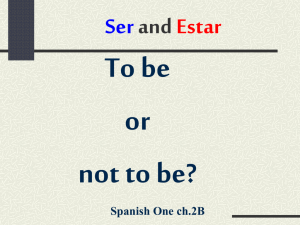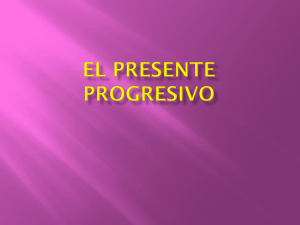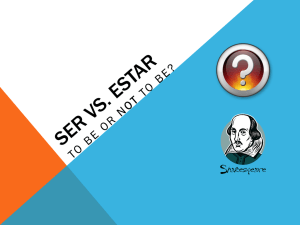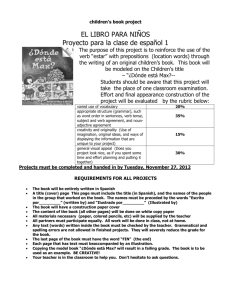EL VOCABULARIO IMPORTANTE Tema 3: Los Cuartos de la Casa
advertisement
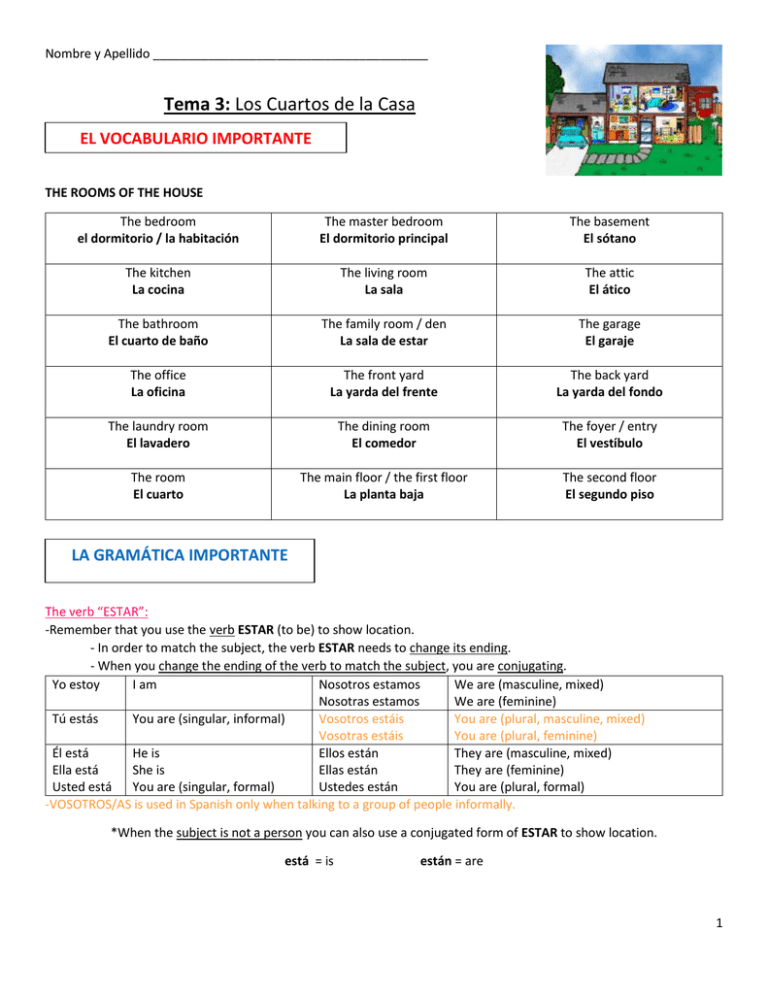
Nombre y Apellido ________________________________________ Tema 3: Los Cuartos de la Casa EL VOCABULARIO IMPORTANTE THE ROOMS OF THE HOUSE The bedroom el dormitorio / la habitación The master bedroom El dormitorio principal The basement El sótano The kitchen La cocina The living room La sala The attic El ático The bathroom El cuarto de baño The family room / den La sala de estar The garage El garaje The office La oficina The front yard La yarda del frente The back yard La yarda del fondo The laundry room El lavadero The dining room El comedor The foyer / entry El vestíbulo The room El cuarto The main floor / the first floor La planta baja The second floor El segundo piso LA GRAMÁTICA IMPORTANTE The verb “ESTAR”: -Remember that you use the verb ESTAR (to be) to show location. - In order to match the subject, the verb ESTAR needs to change its ending. - When you change the ending of the verb to match the subject, you are conjugating. Yo estoy I am Nosotros estamos We are (masculine, mixed) Nosotras estamos We are (feminine) Tú estás You are (singular, informal) Vosotros estáis You are (plural, masculine, mixed) Vosotras estáis You are (plural, feminine) Él está He is Ellos están They are (masculine, mixed) Ella está She is Ellas están They are (feminine) Usted está You are (singular, formal) Ustedes están You are (plural, formal) -VOSOTROS/AS is used in Spanish only when talking to a group of people informally. *When the subject is not a person you can also use a conjugated form of ESTAR to show location. está = is están = are 1 Prepositions: -Prepositions are also used to describe location. Below is a list of some prepositions that are helpful to use when describing the locations of items/furniture in a house. - a la derecha de (to the right of) -a la izquierda de (to the left of) -al lado de (next to) - cerca de (close to) - lejos de (far from) -encima de (on top of) -arriba de (above) -debajo de (under / below) Forming Spanish Contractions – “DE + EL”: -When you are telling location, use de (of) after the preposition followed by the definite artlice (el / la / los / las). -When combing DE + EL form the contraction DEL Ejemplos: If you want to say… The bedroom is to the right of the right of the office. You say… El dormitorio está a la derecha de la oficina. If you want to say…The bedroom is next to the bathroom. You say…El dormitorio está al lado del cuarto de baño. *In this sentence a contraction was formed (de + el = del). In Spanish you cannot have 2 e’s (ee) next to each other. DRILLS & SKILLS PRACTICE Activities in this section will give you guided practice of the learned vocabulary & grammar structures. These activities are designed to help you increase your knowledge, accuracy, confidence, & basic skills in the language. ---------------------------------------------------------------------------------------------------------------------------------------------------------------QUIZLET STUDY LINKS: Go to the following web addresses to study & practice the key terms for this unit’s themes. Rooms of the House - http://quizlet.com/_hfkn0 Prepositions - http://quizlet.com/_j9hj9 The Verb “ESTAR” - http://quizlet.com/_oixxr ---------------------------------------------------------------------------------------------------------------------------------------------------------------Actividad #1: Rooms of the House Matching Write the appropriate letter on the line. 1. The bedroom ________ a. la yarda del fondo 2. The bathroom ________ b. la habitación 3. The basement ________ c. la sala 4. The living room ________ d. la sala de estar 5. The family room ________ e. la planta baja 6. The office ________ f. el segundo piso 7. The laundry room ________ g. la oficina 8. The main floor ________ h. el cuarto de baño 9. The second floor ________ i. el sótano 10. The back yard ________ j. el lavadero 2 Actividad #2: Rooms of the House Picture Identification Identify the vocabulary word. Include the definite article. The bedroom The master bedroom _____________________________ _____________________________ The basement _____________________________ The kitchen _____________________________ The living room _____________________________ The attic _____________________________ The bathroom _____________________________ The family room / den _____________________________ The garage _____________________________ The office _____________________________ The laundry room _____________________________ The dining room _____________________________ Actividad #3: Asking and Answering Questions María y Mario están jugando “Hide and Seek.” María is trying to find Mario. Pretend you are Mario and answer María’s questions, so that you can find Mario. Then write the English translation of the underlined vocabulary word in each question. Below are two examples. María: Mario, ¿Estás tú en el comedor? Mario: No, yo no estoy en el comedor. English Translation: Dining Room María: Mario, ¿Estás tú en la cocina? Mario: Sí, yo estoy en la cocina. English Translation: Kitchen 3 1. María: Mario, ¿Estás tú en la yarda? Mario: _________________________________________________________________________ English Translation: _________________________ 2. María: Mario, ¿Estás tú en el sótano? Mario: _________________________________________________________________________ English Translation: _________________________ 3. María: Mario, ¿Estás tú en el ático? Mario: _________________________________________________________________________ English Translation: _________________________ 4. María: Mario, ¿Estás tú en la sala de estar? Mario: _________________________________________________________________________ English Translation: _________________________ 5. María: Mario, ¿Estás tú en la sala? Mario: _________________________________________________________________________ English Translation: _________________________ Actividad #4: Adivina Quien (Guess Who) Pretend you are the following characters from the Adivina Quien game. Use the Adivina Quien game board to answer each yes or no question. Here is an example: Mario, ¿estás tú en el dormitorio? Sí, yo estoy en el dormitorio. 1. Carolina, ¿estás tú en el lavadero? __________________________________________________________________________________________ 2. Tito, ¿estás tú en el ático? __________________________________________________________________________________________ 3. Margarita, ¿estás tú en la sala de estar? __________________________________________________________________________________________ 4. Frida, ¿estás tú en el garaje? __________________________________________________________________________________________ Use the Adivina Quien game board to answer each yes or no question. Here is an example: ¿Está Dario en el dormitorio? No, Dario, no está en el dormitorio. 1. ¿Está Magdelena en la sala? __________________________________________________________________________________________ 2. ¿Está José en el patio? __________________________________________________________________________________________ 3. ¿Está Catalina en el sótano? __________________________________________________________________________________________ 4. ¿Está Teo en el jardín? __________________________________________________________________________________________ 4 Use the Adivina Quien game board to answer each question in complete sentences. Here is an example: ¿Dónde está Guillermo? Guillermo está en la casa, el comedor, el jardín, el sótano, y la oficina. 1. ¿Dónde está María? __________________________________________________________________________________________ 2. ¿Dónde está Juan? __________________________________________________________________________________________ 3. ¿Dónde está Samanta? __________________________________________________________________________________________ 4. ¿Dónde está Marisol? __________________________________________________________________________________________ 5. ¿Dónde está Dario? __________________________________________________________________________________________ 5 Guillermo María ADIVINA QUIEN GAME BOARD: Juan Samanta Marisol Dario Sara Antonio Tara Daniel Waldo Catalina José Magdelena Teo Mario Carolina Tito Margarita Frida 6 Activdad #5: La Casa de Spongebob – Guided Writing Use a conjugated form of ESTAR, a preposition, and del or de la to describe the location of Spongebob. Complete the chart below. 1. 2. 3. Él/Ella form of ESTAR Preposition del or de la Room of the House 1. Spongebob 2. Spongebob 3. Spongebob Actividad #6: La casa de Spongebob – Reading Comprehension Skills ¿VERDAD O FALSO? Read the description of “La casa de Spongebob.” Next read each statement and decide if the statements are true or false. Mark VERDAD if the answer is true and FALSO if the answer is false. LA CASA DE SPONGEBOB Spongebob vive en una casa mediana con sus pades. Ellos tienen ocho cuartos en su casa. Spongebob tiene un ático, un dormitiorio, un dormitorio principal, un cuarto de baño, una sala de estar, una cocina, un comedor, y un sótano. Spongebob no tiene un lavadero, una sala, una oficina, ni un patio. En la casa de Spongebob el sótano está lejos del ático y debajo de la cocina, debajo de la sala de estar y debajo del comedor. El comedor está debajo del dormitorio y a la derecha de la sala de estar. El dormitorio está arriba del comedor y está a la derecha del dormitorio principal y a la derecha del cuarto de baño. El dormitorio principal está a la 7 izquierda del cuarto de baño y está arriba de la cocina. La sala de estar está a la derecha de la cocina y está a la izquierda del comedor. Arriba del dormitorio, el dormitorio principal y del cuarto de baño está el ático. Verdad Falso 1. Spongebob has 12 rooms in his house. 2. Spongebob does not have a laundry room. 3. Spongebob has a living room but does not have a family room. 4. The kitchen is to the left of the family room. 5. The bedroom is on top of the dining room. 6. The attic is below the master bedroom. 7. The bathroom is to the left of the bedroom and to the right of the master bedroom. 8. The kitchen is to the right of the dining room. 9. The basement is above the attic. 10. The kitchen is under the master bedroom. REAL-LIFE APPLICATIONS Activities in this section will give you the opportunity to apply your knowledge of the vocabulary & grammar structures learned in real-life communicative situations. Use your highest level of proficiency to complete each task. Don’t forget to incorporate all of your prior knowledge. --------------------------------------------------------------------------------------------------------------------------------------------------------------- Listen – Imagine you are a construction worker, building your first house. Your boss has called you to remind you of where to build each room of the house. Draw & label the house he is explaining before your start construction. --------------------------------------------------------------------------------------------------------------------------------------------------------------- Speak – Imagine you are an architect meeting with a client. You are presenting to him or to her the design for his/her dream house. Tell him/her where each room in the house is located. ---------------------------------------------------------------------------------------------------------------------------------------------------------------- Write – Imagine you are a realtor and want to sell this house. Write a newspaper advertisement (paragraph) describing the highlights and tell where some rooms are located. ------------------------------------------------------------------------------------------------------------------ 8 SUMMATIVE ASSESSMENT(S) THE FINAL OUTCOME(S) / THE FINAL PRODUCT(S) HOW WELL DO YOU KNOW THE LEARNED MATERIAL? HERE’S YOUR CHANCE TO SHOW-OFF WHAT YOU HAVE LEARNED! Performance-Based Assessment: ¿Dónde está Waldo? Design & color the inside of a house. Label each room of the house. Your teacher will provide you with a small picture of Waldo to glue into the room of your choice. On a separate sheet of paper, write 8 sentences that describes Waldo’s location. Remember to use your highest level of proficiency to demonstrate your knowledge of the learned material. Rubric Scoring Guide: ¿Dónde está Waldo? Grammar / Vocabulary Sentence Structure Organization &Formatting of Required Elements Ability to Apply Past Applications Visual Organization Meets Expectations (High) (10 -9pts.) Accurate and extensive use of learned vocabulary & grammar structures. Little to no errors that do not interfere with meaning. Uses simple sentences & sentence strings to connect ideas All required elements are present & formatted correctly. Accurate use of vocabulary and grammar expressions from past themes/units. House Design is neat, colorful & creative. Meets Expectations (Low) (8-7pts.) Accurate or extensive use of learned vocabulary & grammar structures. Few errors that do not interfere with meaning. Uses simple sentences & attempts to use sentence strings to connect ideas All required elements are present but not formatted correctly. Use of vocabulary and grammar expressions from past themes/units with little error. House Design is neat & colorful but is predictable. Does Not Meet Expectations (Below 7pts.) Inaccurate and/or little use of learned vocabulary & grammar structures. Some errors that may interfere with meaning. Uses memorized phrases and simple sentences Required elements are missing and not formatted correctly. Fails to use /properly use vocabulary and grammar from past themes/units. House Design may lack neatness, color, and/or creativity. FINAL SCORE: _________ / 50 9

